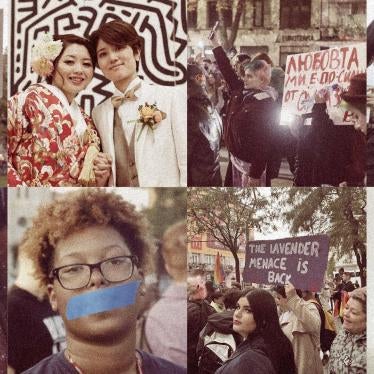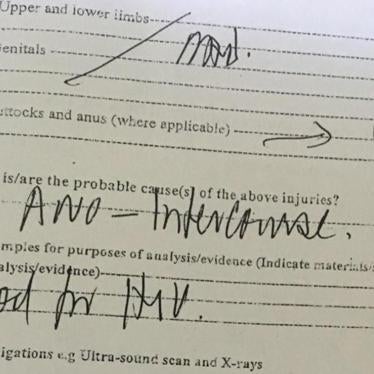The decision by the United Nations Economic and Social Council (ECOSOC) granting consultative status to two groups that work on sexual orientation and gender identity is a victory in the ongoing struggle for inclusion at the UN, a coalition of six human rights organizations said today. The two groups approved on July 21 and 22, 2008 are COC Netherlands and the State Federation of Lesbians, Gays, Transsexuals and Bisexuals of Spain (FELGTB), national organizations representing lesbian, gay, bisexual, and transgender (LGBT) people in the Netherlands and Spain.
“COC Netherlands is delighted about obtaining consultative status with the UN,” said Björn van Roozendaal, COC international advocacy officer. “It means we can join the efforts at the UN to address human rights violations against people with an alternative sexual orientation or gender identity.”
“Spanish-speaking LGBT voices will be heard in UN meetings where human rights questions are debated,” said David Montero, FELGTB Spain’s officer for international issues and human rights. “We thank all who have contributed to this exciting outcome, and especially Spain’s UN mission for their support.”
Consultative status is a key means for civil society to access the UN system. It allows nongovernmental organizations (NGOs) to deliver oral and written reports at UN meetings, and to organize events on UN premises. With it, these groups can share their information and analysis of the abuses and discrimination LGBT people confront around the world.
ECOSOC, consisting of 54 member states of the UN, grants consultative status to NGOs after reviewing recommendations made by its subsidiary body – the NGO Committee – which screens the applications.
COC Netherlands and FELGTB Spain join approximately 3,000 other NGOs with consultative status at the UN. However, only a handful of LGBT groups have received the status. In recent years, some states have treated LGBT groups’ applications with intense hostility, and ECOSOC has only granted such groups consultative status after first overturning negative recommendations from its NGO Committee. ECOSOC approved the Danish National Association for Gay and Lesbians, the European Region of the International Lesbian and Gay Association (ILGA-Europe), and the Lesbian and Gay Federation in Germany in December 2006. The Gay and Lesbian Coalition of Québec and the Swedish Federation for Lesbian, Gay, Bisexual and Transgender Rights gained consultative status in July 2007.
The US-based International Wages Due Lesbians and Australian-based Coalition of Activist Lesbians have had consultative status at the UN for more than a decade.
At its January session, the committee tied 7-7 on consultative status for FELGTB Spain, meaning the motion to recommend it failed, but at the following session in June it voted 7-6 to grant the status for COC Netherlands. At the July session in New York, ECOSOC adopted by consensus the recommendation on COC Netherlands and voted to overturn the recommendation not to grant status to FELGTB Spain.
“ECOSOC has recognized the place of lesbians, gays, bisexuals and transgender people in the work of the United Nations,” said John Fisher from ARC International, which supported the groups’ advocacy efforts. “In this 60th anniversary year of the Universal Declaration of Human Rights, it is particularly important to affirm the core principle that all human beings are entitled to the full enjoyment of all human rights, without discrimination based on sexual orientation or gender identity. Yesterday’s vote sends a clear message that discrimination has no place in the UN system, and that sexual orientation and gender identity issues can, and must, be addressed.”
“Many states that harass or persecute LGBT people at home also try to shut down scrutiny of their records internationally,” said Boris Dittrich, advocacy director of the Lesbian, Gay, Bisexual and Transgender Program at Human Rights Watch. “This vote ensures that two more voices will be raised to defend basic human rights at the UN.”
“States from all five regions voted to overturn the negative recommendation from the NGO Committee in regards to FELGTB Spain,” said Philipp Braun, co-secretary general of the International Lesbian and Gay Association (ILGA). “We would like the committee to acknowledge the repeated message sent by ECOSOC that it should recommend LGBT groups. We also congratulate our members COC and FELGTB on their victory.”
“Many states claim that ECOSOC’s votes need to follow the recommendations of its NGO Committee; the view of those who voted in favor of the LGBT groups, however, is that this cannot be done at the price of discriminating against anyone, including LGBT voices,” noted Adrian Coman from the International Gay and Lesbian Human Rights Commission (IGLHRC), who participated in monitoring the ECOSOC and NGO Committee meetings.
The NGO Committee is due to review a number of additional applications from LGBT groups at its next two sessions in January and May 2009.







